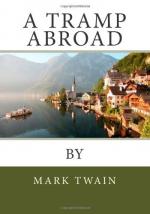We reached Vispach at 8 P.M., only about seven hours out from St. Nicholas. So we must have made fully a mile and a half an hour, and it was all downhill, too, and very muddy at that. We stayed all night at the Ho^tel de Soleil; I remember it because the landlady, the portier, the waitress, and the chambermaid were not separate persons, but were all contained in one neat and chipper suit of spotless muslin, and she was the prettiest young creature I saw in all that region. She was the landlord’s daughter. And I remember that the only native match to her I saw in all Europe was the young daughter of the landlord of a village inn in the Black Forest. Why don’t more people in Europe marry and keep hotel?
Next morning we left with a family of English friends and went by train to Brevet, and thence by boat across the lake to Ouchy (Lausanne).
Ouchy is memorable to me, not on account of its beautiful situation and lovely surroundings—although these would make it stick long in one’s memory—but as the place where I caught the London times dropping into humor. It was not aware of it, though. It did not do it on purpose. An English friend called my attention to this lapse, and cut out the reprehensible paragraph for me. Think of encountering a grin like this on the face of that grim journal:
Erratum.—We are requested by Reuter’s Telegram Company to correct an erroneous announcement made in their Brisbane telegram of the 2d inst., published in our impression of the 5th inst., stating that “Lady Kennedy had given birth to twins, the eldest being a son.” The Company explain that the message they received contained the words “Governor of Queensland, twins first son.” Being, however, subsequently informed that Sir Arthur Kennedy was unmarried and that there must be some mistake, a telegraphic repetition was at once demanded. It has been received today (11th inst.) and shows that the words really telegraphed by Reuter’s agent were “Governor Queensland turns first Sod,” alluding to the Maryborough-Gympic Railway in course of construction. The words in italics were mutilated by the telegraph in transmission from Australia, and reaching the company in the form mentioned above gave rise to the mistake.
I had always had a deep and reverent compassion for the sufferings of the “prisoner of Chillon,” whose story Byron had told in such moving verse; so I took the steamer and made pilgrimage to the dungeons of the Castle of Chillon, to see the place where poor Bonnivard endured his dreary captivity three hundred years ago. I am glad I did that, for it took away some of the pain I was feeling on the prisoner’s account. His dungeon was a nice, cool, roomy place, and I cannot see why he should have been dissatisfied with it. If he had been imprisoned in a St. Nicholas private dwelling, where the fertilizer prevails, and the goat sleeps with the guest, and the chickens




